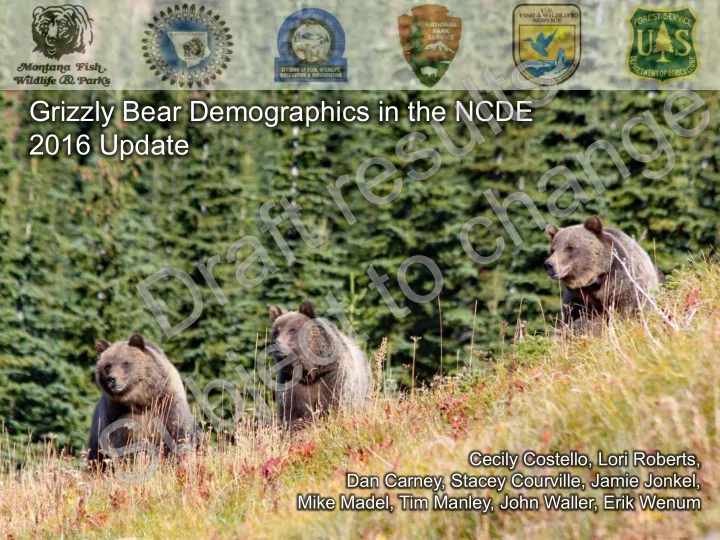

Grizzly Bear Demographics in the NCDE 2016 Update Cecily Costello, Lori Roberts, Dan Carney, Stacey Courville, Jamie Jonkel, Mike Madel, Tim Manley, John Waller, Erik Wenum
Occupancy & Demographics 2016 Update
Occupancy of females with offspring 6-year tally (2011–2016) 6 yrs: 18 BMUs (60%) 5 yrs: 5 BMUs (17%) 4 yrs: 6 BMUs (20%) 2 yrs: 1 BMU (3%)
Survival monitoring 63 grizzly bears captured during 2016 50 fitted with radio-transmitters
Survival monitoring Total of 73 bears monitored and 7 mortalities documented during 2016 Annual survival rate during 2004-2014 was 95% for females and 90% for males
Reproductive monitoring We documented reproductive status for 43 adult females during 2016 Proportion of females with cubs was 29% during 2004-2014
Reproductive monitoring We documented cub litter size for 6 females during 2016 First observation ranged from Apr 11 (den emergence) to Oct 2 (new capture) Estimated mean litter size was 2.1 during 2004-2014
Reproductive monitoring We documented dependent bear survival in 6 cub litters and 10 yearling litters during 2016 Estimated survival was 55% for cubs and 64% for yearlings during 2004-2014
Mortality Monitoring 2016 Update
Mortality monitoring Documented mortality 2016 All age-classes, all locations Ageclass Female Male Total Inside DMA Dependent 4 1 4 Independent 9 4 13 Total 13 5 18 Outside DMA Dependent 0 1 1 Independent 1 2 3 Total 1 3 4 We documented 22 mortalities during 2016 12 in the PCA 18 in DMA 6 in Zone 1 4 outside of the DMA
Mortality monitoring Locations of documented mortality 2016 All age-classes, all locations
Mortality monitoring Causes of mortality 2004-2016 All age-classes, all locations
Sustainable mortality Documented and estimated total mortality 2016 Independent bears inside the DMA Estimated reported Estimated Agency and total removal Telemetry Reported Reported unreported mortality Sex (A) (B) (high) (low) (C) (A+B+C) Female 3 3 1 2 11 17 Male 2 0 2 0 3 5 Total 5 3 3 2 14 22 We documented 13 mortalities of independent (>= 2 years old) bears. We estimated 17 total independent mortalities during 2016
Sustainable mortality Documented and estimated total mortality 2004-2016 Independent bears inside the DMA Slight increase in estimated mortalities during 2004-2016
Sustainable mortality Estimated total mortality versus sustainable mortality thresholds Independent bears inside the DMA 1005 960 765
Sustainable mortality Estimated total mortality versus sustainable mortality thresholds Independent bears inside the DMA
Acknowledgements Scott Waller Rory Trimbo Daniel Madel Rick Mace Erik Peterson James Waddell Kylie Jones Kim Shields Bob Wiesner Shannon Clairmont Flathead-Spotted Bear Ranger District (Deb Mucklow, staff, packers) Flathead-Hungry Horse Ranger District (Rob Davies, staff) Glacier National Park (packers) Ken Justus Rob Cherot Jim Pierce Red Eagle Aviation Two Bear Air Many others…
NCDE Technical Team April 11, 2017 Cecily Costello, FWP Research Lori Roberts, FWP Research John Waller, NPS Glacier Jennifer Fortin-Noreaus, USFWS Tim Manley , FWP Region 1 Hilary Colley, USFWS Kathy Ake, USFS Flathead Wayne Kasworm, USFWS Lydia Allen, USFS Region 1 Kari Eneas, CSKT George Barce, CSKT Ross Baty, DNRC Liz Roberts , USFS Lolo Frank van Manen, USGS IGBST Mark Haroldson, USGS IGBST Lynn Johnson, USFS Kootenai Amy Jacobs, USFS Flathead Tabitha Graves, USGS Dan Carney, Blackfeet Nation Jamie Jonkel, FWP Region 2 Stacy Courville, CSKT Erik Peterson, NPS Glacier
NCDE Technical Team Objectives (1)Facilitate and conduct research focused on producing information that the wildlife and land managers need to attain, maintain, and measure population recovery • Prioritize research needs and report to the NCDE Subcommittee • Respond to information requests made by member agencies, the NCDE Subcommittee, and the IGBC (2)Based on best available science, evaluate the demographic criteria outlined in the Draft NCDE Conservation Strategy (2013) and provide recommendations for revisions to the NCDE Subcommittee
NCDE Technical Team Guiding Principles Prioritize research with direct application to population and habitat management Population dynamics and sustainable mortality Habitat interactions Tools for reducing bear-human conflict Human attitudes Aim for the highest level of scientific rigor Be explicit about assumptions involved in analyses Detail limitations of the available data Acknowledge alternative interpretations of results
NCDE Technical Team Current Projects Potential movement paths for male-mediated gene flow between the NCDE and GYE grizzly bear populations Estimation of unreported mortality: evaluation comparing reporting rates from the NCDE, GYE and CYE Estimation of sustainable mortality in the NCDE Spatial and temporal comparisons of body morphometrics in the NCDE, GYE, and CYE
NCDE Technical Team New Projects Kari Eneas, University of Montana, Confederated Salish and Kootenai Tribes Quantifying the effectiveness of electric fencing in mitigating conflicts between grizzly bears and chicken coops (and potentially small livestock) George Barce, Wildlife Biologist, Confederated Salish and Kootenai Tribes Coordinating grizzly bear and forest management Erik Peterson, Biological Technician, Glacier National Park Grizzly bear use of army cutworm moth aggregation sites in the Northern Continental Divide Ecosystem, Montana
NCDE Technical Team Recovery Plan and Conservation Strategy Recovery Plan Demographic criteria difficult to document given conditions and current monitoring program. Should we try to address? Conservation Strategy New science available to help inform demographic criteria. Discussed possible approaches for revisions.
NCDE Technical Team New Research Prioritization • Habitat selection analyses, with focus on roads, fire history, and forest management • Spatial analyses of human-bear conflicts • Denning chronology / post-denning behavior (joint analysis with CYE) • Montana-wide human dimensions public survey
Recommend
More recommend